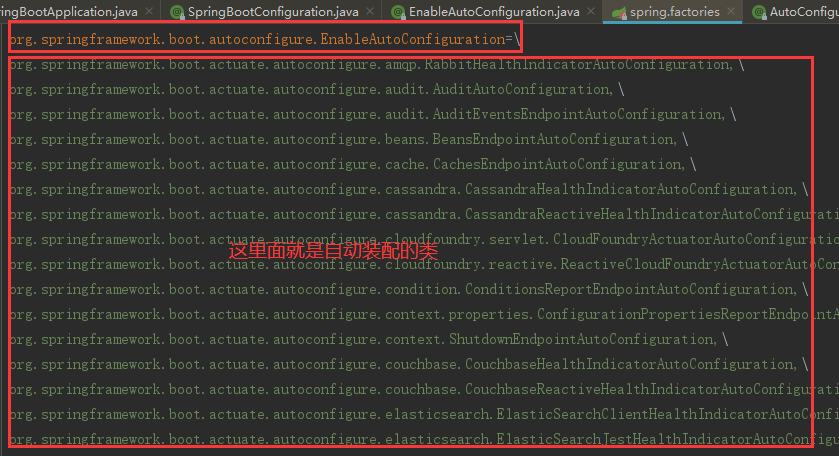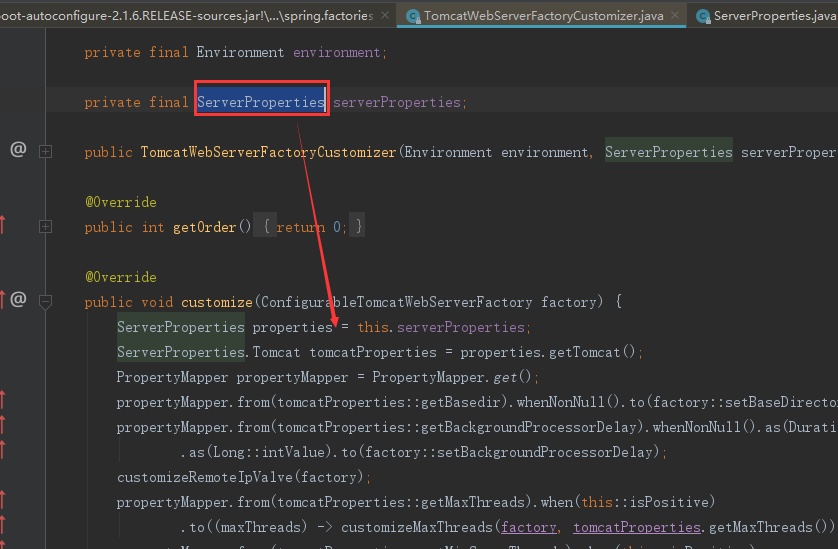Spring Boot系列(四):Spring Boot源码解析
一、自动装配原理

之前博文已经讲过,@SpringBootApplication继承了@EnableAutoConfiguration,该注解导入了AutoConfigurationImport Selector,这个类主要是扫描spring-boot-autoconfigure下面的META-INF\spring.factories中的EnableAutoConfiguration对应的全类名,其中XXXAutoConfiguration都是一个个自动配置类。

自动装配原理具体参考:Spring Boot系列(二):Spring Boot自动装配原理解析
二、Spring Boot的jar启动
1、Spring Boot自动装配Tomcat组件
① EmbeddedWebServerFactoryCustomizerAutoConfiguration内嵌的Web容器工厂定制器自动装配类,装配了TomcatWebServerFactoryCustomizer组件

Tomcat工厂定制器TomcatWebServerFactoryCustomizer用来设置容器的属性,把ServerProperties中的属性设置到Tomcat容器的工厂中。

ServerProperties服务的属性类:

② ServletWebServerFactoryAutoConfiguration,ServletWeb工厂自动装配类,装配了如下四个组件
- ServletWebServerFactoryCustomizer:用来定制ServletWeb服务工厂
- TomcatServletWebServerFactoryCustomizer:用来定制TomcatServletWeb服务工厂
- ServletWebServerFactoryAutoConfiguration.BeanPostProcessorsRegistrar :后置处理器
- ServletWebServerFactoryConfiguration:用来配置TomcatServletWeb服务工厂

2、SpringApplication.run启动流程
① new SpringApplication(primarySources),创建了一个SpringApplication
- public SpringApplication(ResourceLoader resourceLoader, Class<?>... primarySources) {
- this.resourceLoader = resourceLoader;
- Assert.notNull(primarySources, "PrimarySources must not be null");
- //设置主配置类 我们自己写的Spring Boot的启动类
- this.primarySources = new LinkedHashSet<>(Arrays.asList(primarySources));
- //设置web应用的类型
- this.webApplicationType = WebApplicationType.deduceFromClasspath();
- //设置容器初始化器(ApplicationContextInitializer类型的)
- setInitializers((Collection) getSpringFactoriesInstances(ApplicationContextInitializer.class));
- //把监听器设置到SpringApplication中[ApplicationListener]
- setListeners((Collection) getSpringFactoriesInstances(ApplicationListener.class));
- //设置主配置类
- this.mainApplicationClass = deduceMainApplicationClass();
- }
② SpringApplication的run方法:
主要流程:
第一:创建容器对象
第二:去META-INFO/spring.factories中获取SpringApplicationRunListener监听器(事件发布监听器)
第三:发布容器starting事件(通过spring的事件多播器)
第四:封装命令行参数
第五:准备容器环境
第六:打印Springboot的图标
第七:根据webApplicationType来创建容器
第八:准备容器上下文
第九:发布容器启动事件
第十:发布容器运行事件
- public ConfigurableApplicationContext run(String... args) {
- StopWatch stopWatch = new StopWatch();
- stopWatch.start();
- //容器对象
- ConfigurableApplicationContext context = null;
- Collection<SpringBootExceptionReporter> exceptionReporters = new ArrayList<>();
- configureHeadlessProperty();
- //去META-INFO/spring.factories中获取SpringApplicationRunListener监听器(事件发布监听器)
- SpringApplicationRunListeners listeners = getRunListeners(args);
- //发布容器starting事件(通过spring的事件多播器)
- listeners.starting();
- try {
- //封装命令行参数
- ApplicationArguments applicationArguments = new DefaultApplicationArguments(args);
- /**
- * 准备容器环境
- * 1: 获取或者创建环境
- * 2:把命令行参数设置到环境中
- * 3:通过监听器发布环境准备事件
- */
- ConfigurableEnvironment environment = prepareEnvironment(listeners, applicationArguments);
- configureIgnoreBeanInfo(environment);
- //打印Springboot的图标
- Banner printedBanner = printBanner(environment);
- //创建容器根据webApplicationType来创建容器(通过反射创建)
- context = createApplicationContext();
- exceptionReporters = getSpringFactoriesInstances(SpringBootExceptionReporter.class,
- new Class[] { ConfigurableApplicationContext.class }, context);
- /**
- * 准备上下文
- * 1:把环境设置到容器中
- * 2: 循环调用ApplicationContextInitializer进行容器初始化工作
- * 3: 发布容器上下文准备完成事件
- * 4: 注册关于Springboot特性的相关单例Bean
- * 5: 发布容器上下文加载完毕事件
- */
- prepareContext(context, environment, listeners, applicationArguments, printedBanner);
- refreshContext(context);
- //运行ApplicationRunner和CommandLineRunner
- afterRefresh(context, applicationArguments);
- stopWatch.stop();
- if (this.logStartupInfo) {
- new StartupInfoLogger(this.mainApplicationClass).logStarted(getApplicationLog(), stopWatch);
- }
- //发布容器启动事件
- listeners.started(context);
- //运行ApplicationRunner和CommandLineRunner
- callRunners(context, applicationArguments);
- }
- catch (Throwable ex) {
- //出现异常调用异常分析保护类进行分析
- handleRunFailure(context, ex, exceptionReporters, listeners);
- throw new IllegalStateException(ex);
- }
- try {
- //发布容器运行事件
- listeners.running(context);
- }
- catch (Throwable ex) {
- handleRunFailure(context, ex, exceptionReporters, null);
- throw new IllegalStateException(ex);
- }
- return context;
- }
③ org.springframework.boot.SpringApplication#refreshContext
④ org.springframework.boot.SpringApplication#refresh
⑤ org.springframework.context.support.AbstractApplicationContext#refresh
到了AbstractApplicationContext#refresh方法,之前讲过Spring IoC源码解析讲过该方法的12大步,这里就不细说,详细可以参考:Spring系列(三):Spring IoC源码解析,里面说过有一步就是onRefresh(),这个方法默认是空的,由子类根据自身需要去实现
⑥ org.springframework.boot.web.servlet.context.ServletWebServerApplicationContext#onRefresh
该onRefresh方法分2步
第一:super.onRefresh(); 调用父类的onRefresh()
第二:createWebServer();创建Web服务,很重要,很重要,很重要!!!
⑦ createWebServer()方法
第一:ServletContext servletContext = getServletContext(); 获取Servlet的上下文
第二:ServletWebServerFactory factory = getWebServerFactory();获取Tomcat的Web服务工厂
第三:this.webServer = factory.getWebServer(getSelfInitializer()); 创建一个Web服务器

⑧ TomcatServletWebServerFactory#getWebServer()方法,主要用于创建一个Tomcat Web容器

到此我们知道Spring Boot的启动通过Spring IoC的refresh中的的onRefresh()带动了Tomcat的启动,跟我们之前我们学Spring Mvc的时候刚好相反,Spring Mvc的是Tomcat的启动带动了Spring容器的启动;
三、普通Web工程启动
1、普通的web工程,我们找到web.xml,会发现都配置了如下的加载Spring的配置。

2、Tomcat启动的时候会调用该上下文加载的的监听器的contextInitialized方法,我们进入到该方法:

3、进入初始化Web应用上下文initWebApplicationContext方法中:
- this.context = createWebApplicationContext(servletContext);
- configureAndRefreshWebApplicationContext(cwac, servletContext);
4、进去到configureAndRefreshWebApplicationContext(cwac, servletContext)方法中:

5、进入到refresh方法实际就到了org.springframework.context.support.AbstractApplicationContext#refresh的方法
这个方法很熟悉了,Spring IoC的refresh的12大步;
四、Spring Boot启动流程图

Spring Boot系列(四):Spring Boot源码解析的更多相关文章
- spring MVC cors跨域实现源码解析
# spring MVC cors跨域实现源码解析 > 名词解释:跨域资源共享(Cross-Origin Resource Sharing) 简单说就是只要协议.IP.http方法任意一个不同就 ...
- spring MVC cors跨域实现源码解析 CorsConfiguration UrlBasedCorsConfigurationSource
spring MVC cors跨域实现源码解析 spring MVC cors跨域实现源码解析 名词解释:跨域资源共享(Cross-Origin Resource Sharing) 简单说就是只要协议 ...
- 老生常谈系列之Aop--Spring Aop源码解析(二)
老生常谈系列之Aop--Spring Aop源码解析(二) 前言 上一篇文章老生常谈系列之Aop--Spring Aop源码解析(一)已经介绍完Spring Aop获取advice切面增强方法的逻辑, ...
- 老生常谈系列之Aop--Spring Aop源码解析(一)
老生常谈系列之Aop--Spring Aop源码解析(一) 前言 上一篇文章老生常谈系列之Aop--Spring Aop原理浅析大概阐述了动态代理的相关知识,并且最后的图给了一个Spring Aop实 ...
- 第十四章 Executors源码解析
前边两章介绍了基础线程池ThreadPoolExecutor的使用方式.工作机理.参数详细介绍以及核心源码解析. 具体的介绍请参照: 第十二章 ThreadPoolExecutor使用与工作机理 第十 ...
- ThreadPoolExecutor系列<三、ThreadPoolExecutor 源码解析>
本文系作者原创,转载请注明出处:http://www.cnblogs.com/further-further-further/p/7681826.html 在源码解析前,需要先理清线程池控制的运行状态 ...
- 小学徒成长系列—StringBuilder & StringBuffer关键源码解析
在前面的博文<小学徒成长系列—String关键源码解析>和<小学徒进阶系列—JVM对String的处理>中,我们讲到了关于String的常用方法以及JVM对字符串常量Strin ...
- Java 集合系列Stack详细介绍(源码解析)和使用示例
Stack简介 Stack是栈.它的特性是:先进后出(FILO, First In Last Out). java工具包中的Stack是继承于Vector(矢量队列)的,由于Vector是通过数组实现 ...
- Android进阶:四、RxJava2 源码解析 1
本文适合使用过Rxjava2或者了解Rxjava2的基本用法的同学阅读 一.Rxjava是什么 Rxjava在GitHub 主页上的自我介绍是 "a library for composin ...
- 第四章 CopyOnWriteArraySet源码解析
注:在看这篇文章之前,如果对CopyOnWriteArrayList底层不清楚的话,建议先去看看CopyOnWriteArrayList源码解析. http://www.cnblogs.com/jav ...
随机推荐
- CSMA/CD ,现在的交换式以太网还用吗?谈全双工,半双工与CSMA/CD的关系
我们知道:以太网访问控制用的是CSMA/CD,即载波侦听多点接入/ 冲突检测,是以广播的方式将数据发送到所有端口: 我们还知道:交换机能主动学习端口所接设备的MAC地址,在获知该端口的MAC 地址后, ...
- circle踢人(约瑟夫环) c++
这里更新指针法,真的每句都是坑 (寥寥数十句,句句都是坑) // // Created by snnnow on 2020/4/12. //question:转圈,一共N个人,数到M的出列,求最后一个 ...
- 02_Linux实操篇
第五章 VI和VIM编辑器 5.1. VI和VIM基本介绍 Vi编辑器是所有Unix及Linux系统下标准的编辑器,它的强大不逊色于任何最新的文本编辑器.由于对Unix及Linux系统的任何版本,Vi ...
- pandas 几个重要知识点
将 NaN 替换成某一数值 使用 fillna dataframe.fillna(value = 'xxx',inplace=True) 删除某一个值 使用 drop dataframe.drop(1 ...
- 11-Pandas之排序(df.sort_index()、df.sort_values()、随机重排、随机采样)
排序是一种索引机制的一种常见的操作方法,也是Pandas重要的内置运算,主要包括以下3种方法: 排序方法 说明 sort_values() 根据某一列的值进行排序 sort_index() 根据索引进 ...
- PHP curl_share_close函数
(PHP 5 >= 5.5.0) curl_share_close — 关闭 cURL 共享句柄 说明 void curl_share_close ( resource $sh ) 关闭 cUR ...
- 5.4 省选模拟赛 修改 线段树优化dp 线段树上二分
LINK:修改 题面就不放了 大致说一下做法.不愧是dls出的题 以前没见过这种类型的 不过还是自己dp的时候写丑了. 从这道题中得到一个结论 dp方程要写的优美一点 不过写的过丑 优化都优化不了. ...
- luogu P3217 [HNOI2011]数矩形
LINK:数矩形 题意:给出n个点 求出一个最大的矩形. 矩形可以使斜着的.(不会告诉你样例我算了几年 这道题的一个潜规则 矩形面积都是整数 我也不知道为啥一定是整数 姑且是题目输出的要求吧. 所以用 ...
- MySQL进阶篇(03):合理的使用索引结构和查询
本文源码:GitHub·点这里 || GitEE·点这里 一.高性能索引 1.查询性能问题 在MySQL使用的过程中,所谓的性能问题,在大部分的场景下都是指查询的性能,导致查询缓慢的根本原因是数据量的 ...
- 15 张精美动图全面讲解 CORS
前言: 本文翻译自 Lydia Hallie 小姐姐写的
